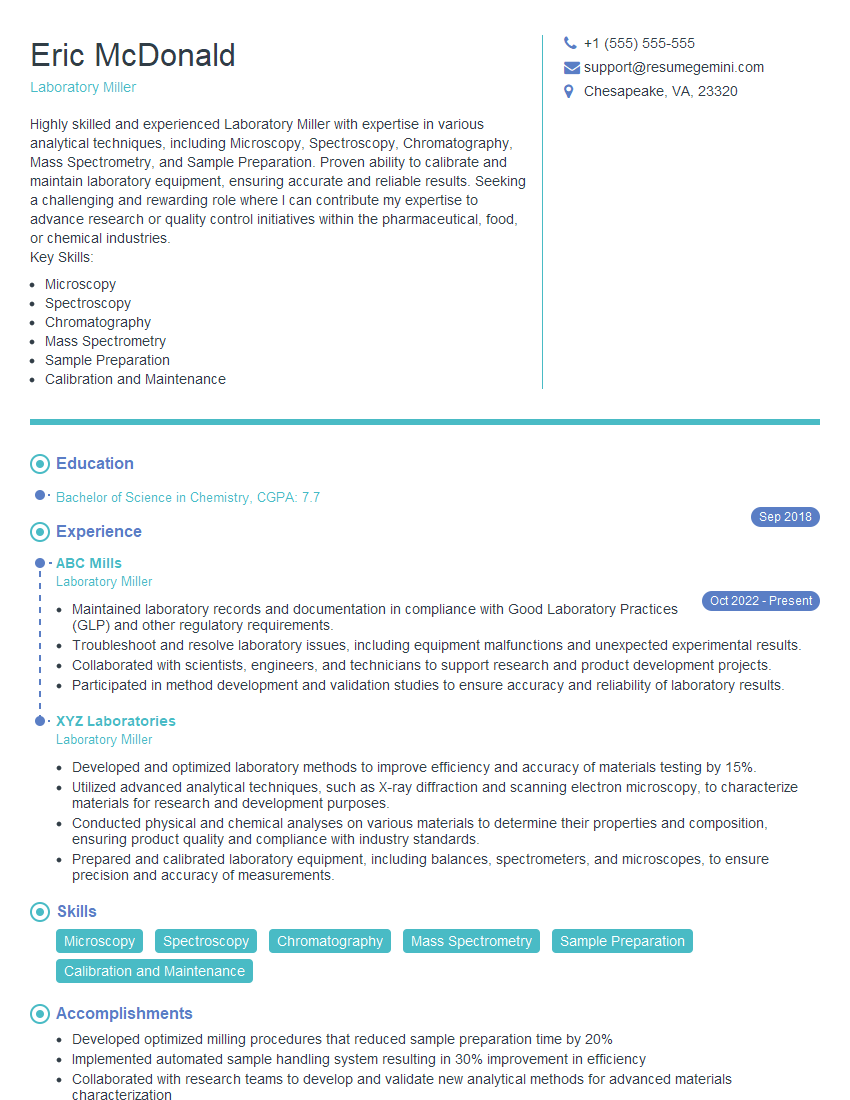Are you a seasoned Laboratory Miller seeking a new career path? Discover our professionally built Laboratory Miller Resume Template. This time-saving tool provides a solid foundation for your job search. Simply click “Edit Resume” to customize it with your unique experiences and achievements. Customize fonts and colors to match your personal style and increase your chances of landing your dream job. Explore more Resume Templates for additional options.

Eric McDonald
Laboratory Miller
Summary
Highly skilled and experienced Laboratory Miller with expertise in various analytical techniques, including Microscopy, Spectroscopy, Chromatography, Mass Spectrometry, and Sample Preparation. Proven ability to calibrate and maintain laboratory equipment, ensuring accurate and reliable results. Seeking a challenging and rewarding role where I can contribute my expertise to advance research or quality control initiatives within the pharmaceutical, food, or chemical industries.
Key Skills:
- Microscopy
- Spectroscopy
- Chromatography
- Mass Spectrometry
- Sample Preparation
- Calibration and Maintenance
Education
Bachelor of Science in Chemistry
September 2018
Skills
- Microscopy
- Spectroscopy
- Chromatography
- Mass Spectrometry
- Sample Preparation
- Calibration and Maintenance
Work Experience
Laboratory Miller
- Maintained laboratory records and documentation in compliance with Good Laboratory Practices (GLP) and other regulatory requirements.
- Troubleshoot and resolve laboratory issues, including equipment malfunctions and unexpected experimental results.
- Collaborated with scientists, engineers, and technicians to support research and product development projects.
- Participated in method development and validation studies to ensure accuracy and reliability of laboratory results.
Laboratory Miller
- Developed and optimized laboratory methods to improve efficiency and accuracy of materials testing by 15%.
- Utilized advanced analytical techniques, such as X-ray diffraction and scanning electron microscopy, to characterize materials for research and development purposes.
- Conducted physical and chemical analyses on various materials to determine their properties and composition, ensuring product quality and compliance with industry standards.
- Prepared and calibrated laboratory equipment, including balances, spectrometers, and microscopes, to ensure precision and accuracy of measurements.
Accomplishments
- Developed optimized milling procedures that reduced sample preparation time by 20%
- Implemented automated sample handling system resulting in 30% improvement in efficiency
- Collaborated with research teams to develop and validate new analytical methods for advanced materials characterization
- Maintained calibration of laboratory equipment according to industry standards, ensuring accurate and reliable results
- Supervised and trained junior millers, fostering a culture of safety and technical proficiency
Awards
- Recognized for outstanding performance in sample preparation and analysis
- Achieved highest accuracy in proficiency testing program for metal analysis
- Received certification from a recognized organization for proficiency in Laboratory Milling
Certificates
- ISO 17025
- ISO 9001
- NIST Traceability
- CLP Certification
Career Expert Tips:
- Select the ideal resume template to showcase your professional experience effectively.
- Master the art of resume writing to highlight your unique qualifications and achievements.
- Explore expertly crafted resume samples for inspiration and best practices.
- Build your best resume for free this new year with ResumeGemini. Enjoy exclusive discounts on ATS optimized resume templates.
How To Write Resume For Laboratory Miller
- Highlight your expertise in specific analytical techniques that are relevant to the job description.
- Quantify your accomplishments with specific metrics, such as the number of samples processed or the reduction in analysis time.
- Showcase your ability to work independently and as part of a team in a laboratory setting.
- Emphasize your commitment to continuous learning and professional development in the field of laboratory analysis.
Essential Experience Highlights for a Strong Laboratory Miller Resume
- Conduct sample preparation and analysis using specialized laboratory techniques and equipment.
- Operate and maintain laboratory equipment, including microscopes, spectrophotometers, chromatographs, and mass spectrometers.
- Calibrate and verify laboratory equipment to ensure accuracy and reliability of results.
- Interpret and analyze experimental data to identify trends and patterns.
- Prepare and present technical reports and presentations to communicate findings and insights.
- Contribute to the development and implementation of new analytical methods to improve efficiency and accuracy.
- Maintain a clean and organized laboratory environment, adhering to safety protocols and regulations.
Frequently Asked Questions (FAQ’s) For Laboratory Miller
What are the primary responsibilities of a Laboratory Miller?
Laboratory Millers are responsible for preparing and analyzing samples using specialized laboratory techniques and equipment. They operate and maintain laboratory equipment, calibrate and verify its accuracy, interpret and analyze experimental data, and prepare technical reports and presentations.
What are the key skills required for a Laboratory Miller?
Key skills for a Laboratory Miller include expertise in Microscopy, Spectroscopy, Chromatography, Mass Spectrometry, Sample Preparation, and Calibration and Maintenance.
What industries employ Laboratory Millers?
Laboratory Millers are employed in various industries, including pharmaceutical, food, chemical, and environmental sectors.
What is the educational background required to become a Laboratory Miller?
A Bachelor of Science degree in Chemistry or a related field is typically required to become a Laboratory Miller.
What are the career advancement opportunities for Laboratory Millers?
Laboratory Millers can advance their careers by specializing in specific analytical techniques, pursuing higher education, or moving into management roles.
What are the key challenges faced by Laboratory Millers?
Laboratory Millers may face challenges related to maintaining the accuracy and reliability of laboratory equipment, interpreting complex experimental data, and keeping up with advancements in analytical techniques.
What are the safety considerations for Laboratory Millers?
Laboratory Millers must adhere to safety protocols and regulations to minimize exposure to hazardous chemicals and materials, and to ensure the safe operation of laboratory equipment.